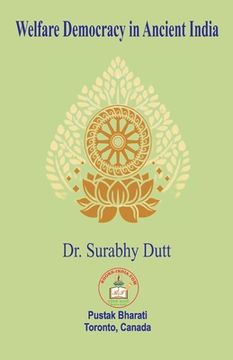Synopsis "Welfare Democracy in Ancient India (in English)"
Welfare Democracy in Ancient India is an illustration of the sound tenets of Dharma that formed the foundation of democracy for people's welfare. It included, Rajdharma, Swarajya, the social order prevalent then, Dandniti or imparting of justice, welfare policy formation, election and selection of rulers, formation of Sabha -Samiti, the local self- government, defense policies, relating to wars, Health care, the system of education, that led to building a strong nation, inspiring self- upliftment and a stable economic order, culminating in high moral values and humanism.Welfare democracy was not merely a form of government, but a way of life. Its efficacy depended on a stable social order adhering to justice, with prudent, public- spirited people at the realm of affairs. The message of the Vedas underlined the formation of tenets of the Dharma, by prominent thinkers of those times. Dharma adhered to Satya, Ahimsa, sound National values, a workable social and political system.It was obvious that the established system of the government, functioned truly to promote all round welfare of the people. The character of the ruler had to be exemplary, to be reflected in the character of the people. The dictum of 'Yatha raja, tatha praja', prevailed. In a welfare state the ruler served his subjects and had to be conscious of his obligation as people's servant. The King's glory was sung by his selfless service and outstanding noble qualities that reflected in his administration and the prejudice free justice he imparted.Dispensing one's duty or adhering to Dharma was the first and foremost ideal to be attained by the ruler and the ruled as well, in their personal, public life, also in political aspirations and roles. So the King and the subjects, both adhered to the tenets of Dharma. The sages and scholars in ancient times provided the richest thought to the world. They took care of all aspects of life, along with physical, metaphysical and philosophical thoughts. They developed scientific and economic theories to develop effecacious, stable working system for people's welfare. National welfare was pramoted thus. Rajdharma, Dandaniti, Four purushartha's, Humanism are a few testimonies of their thinking of people's welfare and working towards attaining it.

